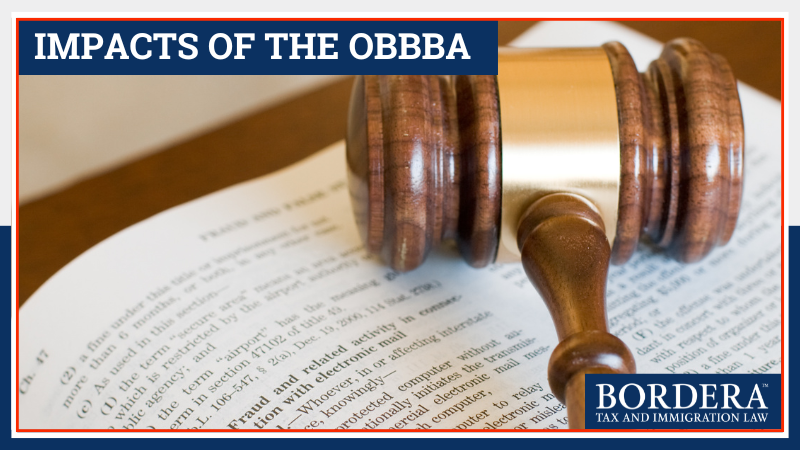
The U.S. One Big Beautiful Bill Act (OBBBA) introduces sweeping changes to tax and immigration policy that directly affect Canadians with cross-border ties. From new business deductions and expanded R&E credits to higher visa fees, new enforcement measures, and remittance taxes, the Act reshapes how Canadians invest, work, and navigate immigration in the U.S. Dual citizens may also face greater complexity when renouncing citizenship. At Bordera Tax and Immigration Law, we help you understand and respond to these changes confidently, whether you're planning to enter the U.S. market, restructure your finances, or protect your family’s immigration status. Contact Bordera Tax and Immigration Law today for personalized cross-border guidance.
The recent enactment of the One Big Beautiful Bill Act (OBBBA) in the United States is more than just another policy update. For Canadians living, working, or investing south of the border, this legislation could significantly impact tax strategies, business expansion, and immigration decisions. Whether you're a business owner, dual citizen, or multinational investor, understanding how these changes affect your situation is critical. At Bordera Tax and Immigration Law, we guide clients through complex cross-border challenges and help them plan with clarity and confidence.
The OBBBA permanently reinstates 100% bonus depreciation for qualifying assets. Canadian businesses investing in U.S. operations can now fully deduct the value of property and equipment in the year it is placed in service, improving cash flow and reducing U.S. tax exposure.
Deduction limits under Section 179 now reach $2.5 million, phasing out at $4 million. This is especially beneficial for smaller Canadian companies setting up shop in the U.S. or upgrading capital equipment.
Immediate expensing for research and experimental expenditures supports faster timelines and more affordable innovation for Canadian firms working cross-border in tech and manufacturing.
These changes offer strong incentives, but also require precise planning. Bordera Tax and Immigration Law can help ensure compliance with both federal and state tax rules while maximizing new savings opportunities.
Most U.S. immigration benefits, including work permits and business visas like L-1A, E-1, E-2, and EB-5, now come with significantly higher filing costs. Work authorization and asylum applications may exceed $1,150 over several years with no waiver options available.
Canadians must now pay a $250 visa bond on all nonimmigrant visas. The bond is refundable only if there’s perfect compliance with exit conditions.
Border and interior enforcement are set to expand. Canadian professionals and families, particularly those in Alberta and Ontario, must be prepared for increased scrutiny and stricter oversight from U.S. immigration authorities.
Cross-border remittances to Canada and beyond are now subject to a 1% excise tax. This new rule could affect household budgeting and long-term financial planning for families with ties in both countries.
Even some U.S. citizen children may now face limited access to health care and tax benefits if their parents are not citizens. Families should be aware of eligibility challenges tied to new policy changes.
Bordera provides full-spectrum support to help you remain compliant, reduce risks, and prepare necessary documentation for any cross-border move.
For dual citizens and expatriates, renouncing U.S. citizenship now involves more paperwork, higher costs, and tougher scrutiny. OBBBA increases enforcement around FATCA, FBAR, and exit tax obligations, making it essential to understand every step of the process before moving forward.
Bordera Tax and Immigration Law supports clients through each phase of renunciation, from dispelling myths to handling filings, so you can exit cleanly, legally, and with financial peace of mind. Our teams in Calgary, Edmonton, and Toronto are ready to assist with even the most complex scenarios.
The One Big Beautiful Bill Act signals a new chapter in U.S. cross-border policy, one that blends opportunity with caution for Canadian citizens and businesses. Whether you need help navigating tax deductions, managing immigration changes, or handling dual citizenship concerns, expert advice can make all the difference. Contact Bordera Tax and Immigration Law today to secure your financial future, protect your assets, and move forward with confidence.
The OBBBA is a U.S. legislative reform package introducing major changes to tax law and immigration procedures. It impacts Canadians with U.S. connections by altering deductions, visa fees, and compliance rules.
Canadian businesses may benefit from new deductions like 100% bonus depreciation and increased Section 179 limits, improving cash flow and reducing tax liability when investing in U.S. operations. Contact Bordera Tax and Immigration Law for more information today.
Yes. Nearly all U.S. immigration-related applications, including work and business visas, now carry higher mandatory filing fees, some exceeding $1,150.